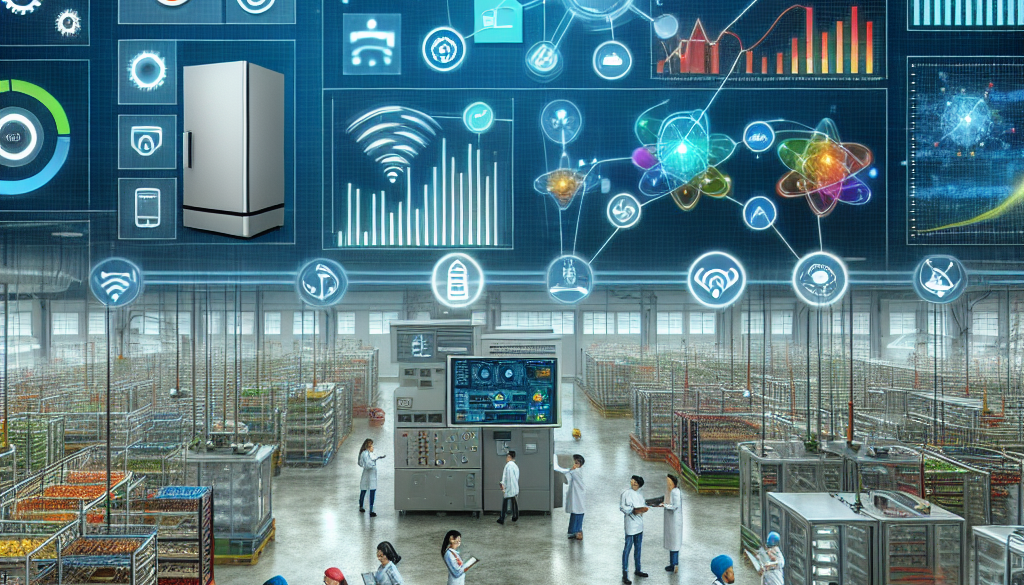Implementing IoT and Big Data for Efficient Food Safety Measures.
-
Table of Contents
- IoT and Big Data: Revolutionizing Food Safety Measures for Efficiency
- The Role of IoT in Food Safety
- Big Data’s Impact on Food Safety
- Case Studies and Statistics
- Challenges and Considerations
- Implementing IoT and Big Data in Food Safety
- Conclusion
- ETprotein: Enhancing Food Safety with High-Quality Protein Products
IoT and Big Data: Revolutionizing Food Safety Measures for Efficiency

The global food industry is a vast and complex network that requires meticulous safety measures to ensure the health and well-being of consumers. With the advent of the Internet of Things (IoT) and Big Data analytics, the food industry is undergoing a transformative shift towards more efficient and reliable food safety practices. This article delves into how these technologies are being implemented to enhance food safety measures, backed by statistics and insights that underscore their growing importance.
The Role of IoT in Food Safety
The Internet of Things (IoT) refers to the interconnected network of physical devices that collect and exchange data. In the context of food safety, IoT devices can be used to monitor various aspects of food production and distribution, including temperature control, humidity levels, and the presence of contaminants. Here are some ways IoT is making a difference:
- Real-time Monitoring: Sensors placed throughout the supply chain can provide real-time data on the condition of food products, alerting managers to potential safety issues.
- Traceability: IoT devices can track the journey of food products from farm to table, making it easier to pinpoint the source of contamination in the event of a foodborne illness outbreak.
- Automated Control Systems: IoT can automate critical control points, reducing the risk of human error and ensuring consistent adherence to safety protocols.
Big Data’s Impact on Food Safety
Big Data refers to the large volumes of data generated by digital and analog sources. In food safety, Big Data analytics can process and analyze vast amounts of information to identify patterns, predict risks, and improve decision-making. The impact of Big Data on food safety includes:
- Predictive Analytics: By analyzing historical data, Big Data can predict potential outbreaks and prevent them before they occur.
- Risk Assessment: Data analysis helps identify high-risk areas in the supply chain, allowing for targeted interventions.
- Consumer Insights: Big Data provides insights into consumer behavior and preferences, which can inform safer food production practices.
Case Studies and Statistics
Several case studies highlight the effectiveness of IoT and Big Data in enhancing food safety. For instance, a report by the MarketsandMarkets research firm predicts that the global food safety testing market will reach $24.6 billion by 2023, with a significant portion of this growth driven by advanced technologies like IoT and Big Data analytics.
Another study by the Food and Agriculture Organization (FAO) and the International Telecommunication Union (ITU) showcases how IoT technologies can reduce food spoilage and waste, with the potential to save up to 40% of food that would otherwise be lost.
Challenges and Considerations
While the benefits of IoT and Big Data in food safety are clear, there are challenges to consider:
- Data Security: The increased use of IoT devices raises concerns about data privacy and security. Robust cybersecurity measures are essential to protect sensitive information.
- Integration: Integrating new technologies into existing systems can be complex and costly. It requires careful planning and execution.
- Regulatory Compliance: Food safety regulations vary by region, and compliance with these standards is crucial for the successful implementation of IoT and Big Data.
Implementing IoT and Big Data in Food Safety
To effectively implement IoT and Big Data in food safety, businesses should consider the following steps:
- Assess Needs: Identify specific areas where IoT and Big Data can address food safety challenges.
- Invest in Technology: Allocate resources to acquire the necessary hardware and software.
- Train Staff: Ensure that employees are trained to use new technologies and understand their role in food safety.
- Monitor and Adapt: Continuously monitor the effectiveness of IoT and Big Data initiatives and be prepared to adapt strategies as needed.
Conclusion
The integration of IoT and Big Data into food safety measures represents a significant leap forward in ensuring the integrity of our food supply. By leveraging real-time monitoring, traceability, predictive analytics, and risk assessment, the food industry can better protect consumers from foodborne illnesses and contamination. While challenges such as data security and regulatory compliance must be addressed, the potential benefits of these technologies are too great to ignore. As the industry continues to evolve, IoT and Big Data will undoubtedly play a central role in shaping the future of food safety.
ETprotein: Enhancing Food Safety with High-Quality Protein Products
In line with the advancements in food safety, ETprotein company’s protein products stand out as a reliable choice for consumers and manufacturers alike. Their commitment to quality and safety is evident in their range of organic bulk vegan proteins and L-(+)-Ergothioneine (EGT), which are produced with the highest standards in mind. By choosing ETprotein, businesses can ensure that their food products not only meet safety regulations but also cater to the growing demand for health-conscious options.
About ETprotein:
ETprotein, a reputable protein and L-(+)-Ergothioneine (EGT) Chinese factory manufacturer and supplier, is renowned for producing, stocking, exporting, and delivering the highest quality organic bulk vegan proteins and L-(+)-Ergothioneine. They include Organic rice protein, clear rice protein, pea protein, clear pea protein, watermelon seed protein, pumpkin seed protein, sunflower seed protein, mung bean protein, peanut protein, and L-(+)-Ergothioneine EGT Pharmaceutical grade, L-(+)-Ergothioneine EGT food grade, L-(+)-Ergothioneine EGT cosmetic grade, L-(+)-Ergothioneine EGT reference grade and L-(+)-Ergothioneine EGT standard. Their offerings, characterized by a neutral taste, non-GMO, allergen-free attributes, with L-(+)-Ergothioneine purity over 98%, 99%, cater to a diverse range of industries. They serve nutraceutical, pharmaceutical, cosmeceutical, veterinary, as well as food and beverage finished product distributors, traders, and manufacturers across Europe, USA, Canada, Australia, Thailand, Japan, Korea, Brazil, and Chile, among others.
ETprotein specialization includes exporting and delivering tailor-made protein powder and finished nutritional supplements. Their extensive product range covers sectors like Food and Beverage, Sports Nutrition, Weight Management, Dietary Supplements, Health and Wellness Products, and Infant Formula, ensuring comprehensive solutions to meet all your protein needs.
As a trusted company by leading global food and beverage brands and Fortune 500 companies, ETprotein reinforces China’s reputation in the global arena. For more information or to sample their products, please contact them and email sales(at)ETprotein.com today.












